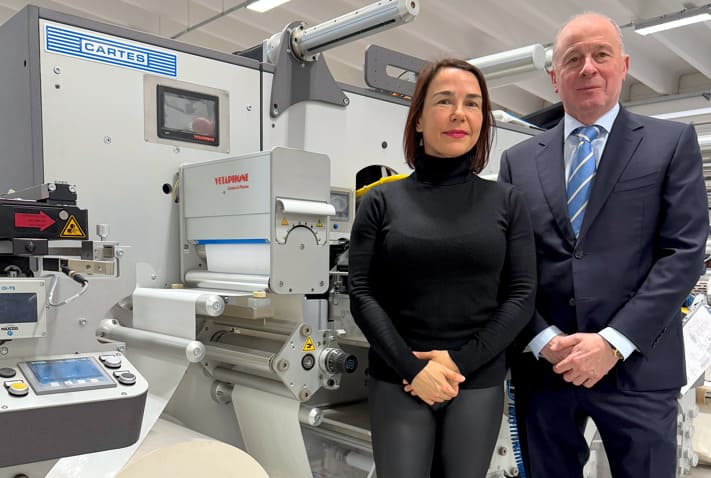According to Sales & Marketing Manager Enrica Lodi: “We have always specialised in the high value-added sector of the narrow web market and have a reputation for pioneering innovative solutions for the self-adhesive, linerless, roll to roll printing, finishing, and converting processes.” Today, the company’s workforce has more than 60 specialist technicians engaged in design and manufacture in its 12,000 sqm facility in the Mantova Province, some 200km south-east of Milan.
From a small start in 1970 the business began to grow significantly in the 1980s with a global growth in demand for self-adhesive labels. This began an export drive by Cartes that now sees more than 4,300 of its machines installed and in daily operation in over 100 countries around the world – some achievement for a family business! Highlights down the years have included a new factory in 2012, the R&D and launch of the Jet D-Screen technology in 2019, and the opening of a branch facility in New Jersey, USA in 2020.
One factor that has remained unchanged throughout is the company’s approach to R&D. Enrica Lodi explained: “Many of our customers say they choose Cartes because we have an flexible mind – we are always prepared to customise and personalise our equipment to suit theirrequirements even if it breaks our production model – customers’ needs always come first here!” And it was this attention to detail that first brought Cartes into contact with Vetaphone back in 2012.
As the inventor and acknowledged global pioneer of corona surface treatment, Vetaphone is also a family-owned business with a reputation for customer-orientation that aligns well with that of Cartes. Speaking for Vetaphone, Giuseppe Rossi, who is Area Sales Manager for Italy commented: “We understand that customer requirements can vary considerably and that a ‘one size fits all’ approach will not work, especially when dealing with a specialist manufacturer like Cartes.”
One of the linchpins of the close working partnership that has developed over the past 12 years is a mutual appreciation of each other’s attention to detail and adaptability. This was most clearly shown with Cartes’ desire to work with co-suppliers whose technology could be fully integrated with their own. In Vetaphone’s case, this not only related to the Corona Treater but also the Web Cleaner.
The two units, that are mounted adjacent to each other can both be controlled from the same operator panel which itself can be fully integrated with the Cartes machine. “This is especially useful on machines where we have more than one Corona Treater, sometimes as many as three, all of which are at different positions in the line – being able to integrate them on one control panel is both more ergonomic for the operator and maximises efficiency for the entire production line,” explained Enrica Lodi.
Giuseppe Rossi added: “From a supplier’s point of view, Cartes makes life straightforward becauseall its machines have the same 350mm working web width. By limiting one parameter, both companies can focus on maximising efficiency and cost control. Vetaphone Corona Treaters can be specified with a variety of options to meet exact production requirements, but if we are always manufacturing to the same web width, we can offer cost-saving production benefits too.”
The reality is that the numbers speak for themselves: Cartes now manufactures and ships around 120 machines a year, which is likely to accelerate as the demand from the digital sector continues apace.“Our technology makes life easier for the operator, which in a global market that is experiencing a worrying level of skill shortage, highlights the need for more automation. This means more control integration and that is the strength of the Cartes/Vetaphone working arrangement,” she added.
The company’s current product portfolio. Includes technology for hot stamping, silk screen printing, digital embellishment, flexo printing and varnishing, flatbed and semi rotary die cutting, and embossing. In addition, Cartes offers its unique Laser technology for die cutting and converting. The single or dual 350W laser is suitable for paper or film, which thanks to its RF power control and ‘cut on the fly’ software offers maximum performance across any shape or cut-through programme. Known by Cartes as ILC (Invisible Laser Cutting) it allowsdark printed labels to be die cut without a white edge.
Looking ahead, Enrica Lodi sees future investments targeted at increased automation on the production floor and a ramping up of output to meet growing demand from the markets of the USA, Brazil, Chile and Argentina across the Atlantic and in France and Spain in Europe, while Japan remains a strong market for laser die cutting.
Summing up for Vetaphone, Giuseppe Rossi stated: “It’s always a pleasure to work with a company like Cartes where there is so much synergy with the Vetaphone business ethos. We have developed a strong cooperative partnership based on mutual trust and a joint desire for innovation andwe look forward to playing a key partin their growth and future development.”





